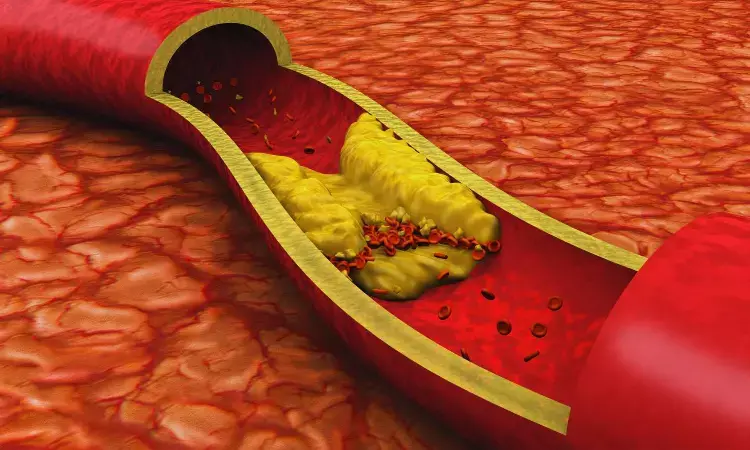- Home
- Medical news & Guidelines
- Anesthesiology
- Cardiology and CTVS
- Critical Care
- Dentistry
- Dermatology
- Diabetes and Endocrinology
- ENT
- Gastroenterology
- Medicine
- Nephrology
- Neurology
- Obstretics-Gynaecology
- Oncology
- Ophthalmology
- Orthopaedics
- Pediatrics-Neonatology
- Psychiatry
- Pulmonology
- Radiology
- Surgery
- Urology
- Laboratory Medicine
- Diet
- Nursing
- Paramedical
- Physiotherapy
- Health news
- Fact Check
- Bone Health Fact Check
- Brain Health Fact Check
- Cancer Related Fact Check
- Child Care Fact Check
- Dental and oral health fact check
- Diabetes and metabolic health fact check
- Diet and Nutrition Fact Check
- Eye and ENT Care Fact Check
- Fitness fact check
- Gut health fact check
- Heart health fact check
- Kidney health fact check
- Medical education fact check
- Men's health fact check
- Respiratory fact check
- Skin and hair care fact check
- Vaccine and Immunization fact check
- Women's health fact check
- AYUSH
- State News
- Andaman and Nicobar Islands
- Andhra Pradesh
- Arunachal Pradesh
- Assam
- Bihar
- Chandigarh
- Chattisgarh
- Dadra and Nagar Haveli
- Daman and Diu
- Delhi
- Goa
- Gujarat
- Haryana
- Himachal Pradesh
- Jammu & Kashmir
- Jharkhand
- Karnataka
- Kerala
- Ladakh
- Lakshadweep
- Madhya Pradesh
- Maharashtra
- Manipur
- Meghalaya
- Mizoram
- Nagaland
- Odisha
- Puducherry
- Punjab
- Rajasthan
- Sikkim
- Tamil Nadu
- Telangana
- Tripura
- Uttar Pradesh
- Uttrakhand
- West Bengal
- Medical Education
- Industry
FDA Approves Inclisiran as First-Line LDL-C Treatment Without Statins

The FDA has approved inclisiran (Leqvio) for first-line use in lowering LDL cholesterol, even without combining it with statins, according to Novartis.
The FDA proactively requested the label update based on the robust LDL-C lowering data for PCSK9-targeting therapies.
"This first-line label update reinforces Leqvio's proven ability to effectively lower LDL-C, a critical risk factor for heart disease," said Victor Bultó, President, US, Novartis. "With this new indication enabling Leqvio's use as monotherapy along with diet and exercise, we now have the potential to help even more patients achieve their LDL-C lowering goals earlier in their treatment journey."
With its twice-yearly, health care provider-administered dosing, Leqvio is uniquely positioned to help support patient adherence and long-term LDL-C management, including goal attainment. This is a critical unmet need, as up to 80% of ASCVD patients in the US struggle to reach the LDL-C guideline-recommended target of <70 mg/dL. This need is heightened by the latest 2025 ACC/AHA Joint Committee Clinical Practice Guideline for the Management of Patients with Acute Coronary Syndromes, which recommends more aggressive treatment to achieve LDL-C targets.
The updated label removes the requirement for Leqvio to be used on top of or in combination with statin therapy. Other updates include revising "primary hyperlipidemia" to the more specific term of "hypercholesterolemia" throughout the label, to more accurately focus on LDL-C reduction.
After an initial dose and another at three months.
About Leqvio
Leqvio is an injectable prescription medicine indicated as an adjunct to diet and exercise to reduce low-density lipoprotein cholesterol (LDL-C) in adults with hypercholesterolemia, including heterozygous familial hypercholesterolemia (HeFH).
Novartis has obtained global rights to develop, manufacture and commercialize Leqvio under a license and collaboration agreement with Alnylam Pharmaceuticals, a leader in RNAi therapeutics.
About Atherosclerotic Cardiovascular Disease (ASCVD)
Cardiovascular disease (CVD) affects hundreds of millions of people and claims more lives globally than cancer, chronic lung disease and diabetes combined. Around 80% of premature cardiovascular deaths can be prevented by addressing factors that cause or worsen CVD.
ASCVD accounts for 85% of all CV deaths. Its burden in the US is greater than that of any other chronic diseases. ASCVD is caused by the development and growth of plaques in the inner lining of the arteries. The atherosclerotic plaque is mainly composed of low-density lipoprotein cholesterol (LDL-C) that accumulates over time. Cumulative exposure to LDL-C can increase one's risk of cardiovascular events such as a heart attack or stroke.
Dr Kamal Kant Kohli-MBBS, DTCD- a chest specialist with more than 30 years of practice and a flair for writing clinical articles, Dr Kamal Kant Kohli joined Medical Dialogues as a Chief Editor of Medical News. Besides writing articles, as an editor, he proofreads and verifies all the medical content published on Medical Dialogues including those coming from journals, studies,medical conferences,guidelines etc. Email: drkohli@medicaldialogues.in. Contact no. 011-43720751


